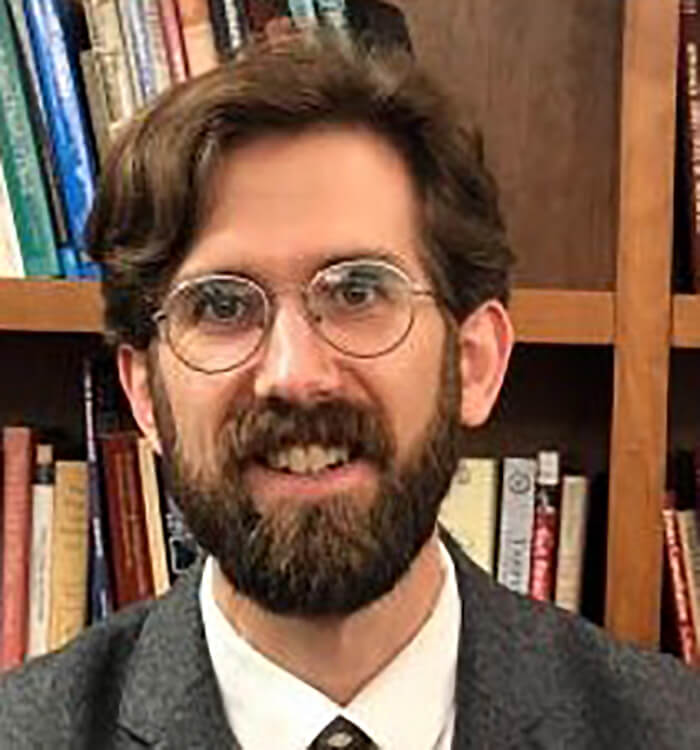University Hospitals Bioethicists Help Caregivers and Patients Navigate Ethical Dilemmas
March 31, 2022
UH Clinical Update | April 2022
Robert Guerin, PhD, Clinical Ethicist, University Hospitals, and Clinical Assistant Professor of Bioethics at Case Western Reserve University, has always tried to understand our world, its complex social and material nature, and our place in it. That unique and intentional pursuit lead him to major in Philosophy. “Becoming a bioethicist was not premeditated,” Guerin said.
 Robert Guerin, PhD
Robert Guerin, PhDWhile studying for his PhD at the University of Kentucky, the department chair asked him to teach a class on bioethics. By luck, a clinical ethicist at the university pulled him aside at a philosophy lecture soon after. “You should come over to the hospital and hang out, and I’ll introduce you to the people in the bioethics program,” she told me,” said Guerin. That was the opportunity that set him on a path toward clinical ethics.
Many may wonder what does a bioethicist do and who needs his services. According to Guerin, people typically contact a bioethicist when they need to make a difficult decision that they don’t feel equipped to handle. “My goal as a clinical ethicist is to help others articulate what is most important to them in the healthcare setting, perhaps for the first time. I try to respect the interests, rights, and responsibilities of all parties involved, not simply the person seeking consultation.”
Anyone in the hospital can consult a clinical ethicist. Caregivers such as physicians and nurses, patients, patients’ families, and surrogates have all approached Guerin at one time or another, and he is eager to help.
“Recently, I helped a practitioner respond to a patient he felt was asking for inappropriate medical care. I didn’t tell the practitioner what to do. But we talked about how he felt with the patient, why the patient’s request upset him, and why the patient might have a reason to make such a request. We arrived at a solution that all stakeholders appeared to accept,” Guerin said.
The types of ethical issues a bioethicist can help navigate are many and varied, including:
- Ethical practices in end-of-life care
- Research like clinical trials
- Shared decision making with patients and families
- Ethical practices at the beginning of life
- Patient privacy and confidentiality
- Professionalism with patient care
- Ethical practices in resource allocation
UH was at the forefront of establishing bioethics as a discipline. In 1975, the late Dr. Joseph Foley, MD, former Chair of the Neurology Department and Professor Emeritus Stuart Youngner, MD, Professor of Psychiatry and Bioethics, and Barbara Day, RN, a former critical care nurse, philosopher, and Distinguished University Professor, established the first Hospital Ethics Committee at UH.
The committee was formed in response to ethical issues at the end of life in the new intensive care units at UH. They created a setting to discuss cases that would eventually shape policy. Because of their work, UH became one of the first hospitals in the country to produce a detailed Do Not Resuscitate (DNR) policy which they published in medical literature. This team’s work influenced national Physician Orders for Life-Sustaining Treatment (POLST) recommendations. The group formally created the UH Ethics Program with Dr. Youngner as its first director in 1994.
Guerin accepted a Clinical Ethics Fellowship in Advanced Bioethics at the Cleveland Clinic in 2016. “It was an intensive training program,” he said. Guerin worked at the Clinic for two years. But he also spent time working at UH, where he shadowed a bioethicist who left a lasting impression.
“Barbara Daly had this remarkable ability to connect with patients and their families. She’s an incredible ethicist and philosopher but also compassionate with an intuitive understanding of supportive therapy. Barb supported and guided people toward making the right decisions. I knew that was the practice model I wanted to follow. She was one of the reasons I spent more time at UH and ended up working here,” he said.
Guerin began working at UH full-time as a Clinical Ethicist in 2018. The Bioethics department currently consists of Guerin and his colleague Olubukunola M. Dwyer, JD, also a Clinical Ethicist and Clinical Assistant Professor of Bioethics at Case Western Reserve University.
When Guerin isn’t at the hospital fielding ethics inquiries, he is a candidate in the adult training program at the Cleveland Psychoanalytic Center. He maintains a private practice in psychotherapy and psychoanalysis in University Circle.
“Ethical issues may occur when you feel in your gut that something isn’t right, yet you might not be able to articulate why. That’s a good reason to consult an ethicist. After we talk through your dilemma, it might turn out that your gut is right. If not, we can figure out how to handle the situation differently. It may be that something else is going on, and if so, I might be able to refer you elsewhere. Ultimately, I believe most people want to do the right thing,” Guerin said.
If you want to consult Dr. Guerin for a possible consultation, please email at Robert.Guerin@UHhospitals.org.


